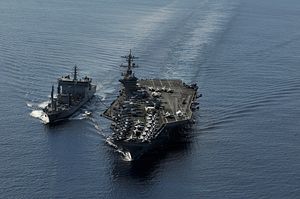My colleague Franz-Stefan Gady wrote an excellent reflection on the troublesome epistemic problems in military planning (see ‘The Fog of Peace’: Why We Are Not Able to Predict Military Power). While his thoughts were perhaps more on the conceptual side than the usual content you see on this blog, the point being made is absolutely central to how budding strategists ought to think about the world, be they in Beijing, New Delhi, Tokyo, or Washington. Indeed, contemporary military analysis might be ever-so-slightly favoring technology as a variable in determining power at the expense of other factors including, but not limited to, geography, manpower, tactics, and even morale. Situated as we are, in the “fog of peace,” we tend to follow our instincts and heuristics, leading to a disproportionate focus on technology.
Technology plays an important role in many analytical frameworks studying complex social and economic phenomena. One of the most famous insights in neo-classical macroeconomics, for example, was the Solow-Swan exogenous growth model — an economic model of long-run growth that explains macroeconomic growth by looking at several variables, but most critically, changes in productivity via technology. While this model ended up earning one of its progenitors a Nobel Prize in his field, today the insight that technology creates geometric growth in productivity and efficiency is second nature for strategic planners in business and defense alike — an obvious truism. The ability to neatly resolve the effect of a particular technological innovation on aggregate growth proved to be both a powerful and exciting insight.
Franz’s concern that today’s “tech-crazed world” overhypes “disruptive technologies” is well-placed, nonetheless. In examining the trees, we miss the forest altogether. In his piece, Franz used the example of the French and British governments overestimating the strengths of the Czech, Polish, and Italian armies. While that’s an apt example of over-thinking capabilities, another that immediately strikes the mind is the tendency of modern militaries to repeatedly and categorically, across decades and continents, underestimate the efficacy of insurgents and guerilla fighters. From Algeria to Vietnam to Iraq, the side with the more impressive technological spec sheet found itself struggling to achieve even the most modest of objectives. The missing link wasn’t technical (for instance, bigger and better tanks), but organizational and strategic (sensible counter-insurgency).
I will say though, in defense of strategic planners the world over, that the role of a strategic mind is to necessarily think the unthinkable and prepare for all contingencies. When the stakes for governments are as high as total national annihilation (in the case of total nuclear war, for example), then it isn’t unreasonable to pay fleets of analysts to study inter-continental ballistic missiles and anti-ballistic missile technology. Israel, a nation whose leaders perceive its territory as under a continuous existential threat, saw it fit to implement its impressive Iron Dome air defense system as a brute force technical solution. In a less extreme example, when the United States faces the prospect of Chinese DF-21D “carrier-killer” missiles sinking multi-billion dollar nuclear carriers, it makes sense to break down the spec sheet of the DF-21D and the Nimitz-class carrier to figure out how best to, on paper, proffer a solid counterstrike.
The unfortunate rub with military planning is that applying the scientific method becomes particularly difficult. As Franz notes, “War alone can test how well a military force and its weapons will perform on the battlefield.” As a corollary, hypotheses regarding the efficacy of a certain technological innovation are often never tested in controlled environments. In the “fog of peace,” defense budgeting and strategic planning all come down to incredibly educated guesswork.
In truth, the inherent uncertainty and ambiguity about technical capabilities in military planning probably prevents more conflict than it causes. In a thought experiment, were every potential aggressor to have perfect information about the resolution of a purely technical conflict (similar to knowing your opponent’s move ahead of time in a game of rock-paper-scissors), there would be no reason to march on the offense. Even the United States, the world’s biggest military spender and most sophisticated military machine, lacks anything close to this.
All said and done, technology certainly matters to a limit. Technical dominance does not imply victory, nor does technical inferiority mandate defeat. Human ingenuity and the very terrain of the battlefield can and will end up making all the difference.

































